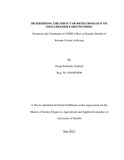| dc.description.abstract | The advancement in biotechnology has been advocated for by many
scientists as carrying the ultimate cure to Africa’s poverty and food
insecurity. There is, however, another school of thought opposed to this
advocacy; one that view biotechnology as a disaster in the making to both
the environment and human livelihoods. This thesis examines the
economic relevance of biotechnology to small scale farmers amid growing
concerns that most Kenyan farmers are too poor to benefit from
biotechnology. To find answers to the raised concerns, a total of 80 rice
farmers from Nyando in Kisumu County were sampled and interviewed in
a bid to determine suitability and economic potential of biotechnology to
smallholder farmers. Whereas the 80 farmers represented the smallholder
farmers in general, the New Rice for Africa (NERICA) represented
biotechnology. The study employed both cost-benefit and linear
programming analyses. As part of the cost-benefit analysis, the Farm
profit model was used to generate data on the profitability of the various
enterprises with each being analyzed separately. In this regard,
conventional rice was found to generate the highest gross margin per acre
followed by NERICA, maize and sorghum respectively. To take into
account the resource constraints facing farmers, the costs and benefits
associated with the various crop enterprises were subjected to linear
programming (LP) analysis, where all the possible enterprises were
evaluated jointly. The LP results showed that with the current yield,
prices, input costs and resource availability, conventional rice is the most
competitive followed by NERICA, maize and sorghum respectively.
Turning to the economic potential of biotechnology, it was established that
the NERICA technology has capacity to improve smallholder farmers’
incomes by up to 300%. The sustainability of such potential benefits
however requires provision of adequate support in terms of credit and
yield enhancing research. Given the needs of the nation, available
resources and the income generation capacity of biotechnology,
stakeholders should promote and effectively support development of
biotechnology. This will avail benefits to farmers and provide a solution to one of the country’s headaches, food security. | en |

